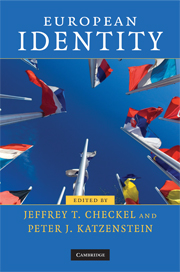Book contents
- Frontmatter
- Contents
- List of figures
- List of tables
- List of contributors
- Preface
- 1 The politicization of European identities
- Part I European identity as project
- Part II European identity as process
- 5 Being European: East and West
- 6 Who are the Europeans and how does this matter for politics?
- 7 Immigration, migration, and free movement in the making of Europe
- Part III European identity in context
- Bibliography
- Index
7 - Immigration, migration, and free movement in the making of Europe
Published online by Cambridge University Press: 05 June 2012
- Frontmatter
- Contents
- List of figures
- List of tables
- List of contributors
- Preface
- 1 The politicization of European identities
- Part I European identity as project
- Part II European identity as process
- 5 Being European: East and West
- 6 Who are the Europeans and how does this matter for politics?
- 7 Immigration, migration, and free movement in the making of Europe
- Part III European identity in context
- Bibliography
- Index
Summary
Europe historically has been made, unmade, and remade through the movements of peoples. Despite the image today of Europeans as a rather sedentary and socially immobile population – particularly when compared to the highly mobile spatial and social patterns of North Americans – contemporary Europe has essentially emerged out of a crucible of local, regional, and international population movements over the centuries.
In this chapter, I consider the crucial impact of migration in Europe on European identity, by building a bridge between historical analyses of the phenomenon and emerging patterns that are shaping Europe as a distinctive new regional space of migration and mobility. My contribution points to how migration is making and remaking Europe, less at the level of identity in people's heads – in fact, if anything, most migrations are contributing to the growth of anti-European sentiment – but more in a territorial and (especially) structural economic sense. This is less easy to see if a purely cultural view is taken of the question of Europe. After sketching the role of population movements in the making and unmaking of Europe historically, I explore in depth the three kinds of migration/mobility that are most salient to the continent today and its structural transformation: first, the ongoing, traditional “ethnic” immigration of non-Europeans into European nation-states; second, the small but symbolically important emergence of new intra-European “elite” migrations, engaged by European citizens enjoying the fruits of their EU free movement rights; and third, the politically ambiguous flows of East–West migrants – which fall somewhere between the other two forms – that have been connected to the EU enlargement processes formalized in 2004 and 2007.
- Type
- Chapter
- Information
- European Identity , pp. 167 - 190Publisher: Cambridge University PressPrint publication year: 2009
- 36
- Cited by

